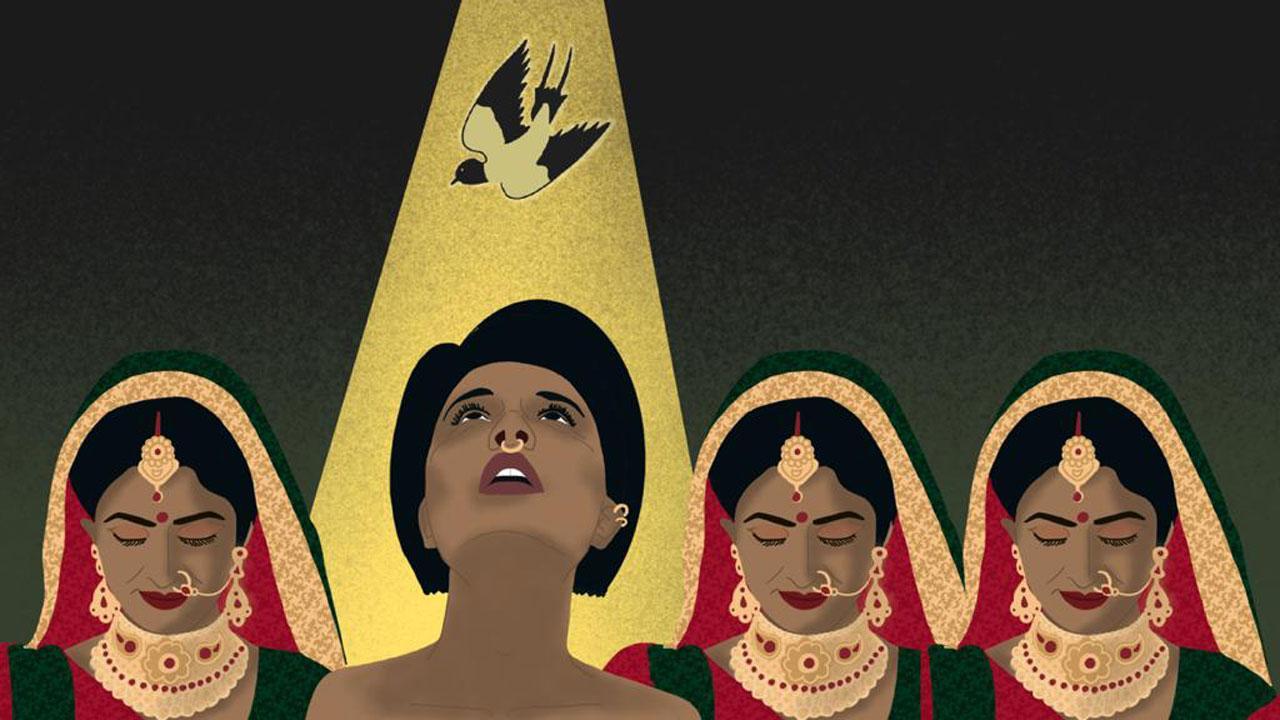Artist Smish Designs talks about her new show ‘Pati, Patni Aur Woke’, the popularity of digital art and why she chose to be anonymous

One of the artworks from 'Pati, Patni Aur Woke'
In 2019, Method Art Space opened its doors to the public in Kala Ghoda. Now, it has also established a space in Bandra. Since the beginning, the art gallery has been hosting some of the most cutting-edge new voices of the art world. Recently, they concluded an art show by Mumbai-based street artist Tyler - often referred as the ‘Indian Banksy’. Now, they are back with a new show, ‘Pati, Patni Aur Woke’, by artist Smish Designs. In an email interview with mid-day.com, the artist talks about the show and why she chooses to be anonymous.
ADVERTISEMENT
Excerpts from the interview:
What is ‘Pati, Patni Aur Woke’ and how did you come up with the concept?
‘Pati, Patni Aur Woke’ is an exhibition that delves into the many layers of marriage as an institution and how women are disadvantaged within it. I try and capture the many atrocities that women are subject to within wedlock while also covering the subtleties of this patriarchal norm that suffocates women. This is purely my take on marriage as this grand convention and I thought of doing it because I’ve grown up seeing excessively bad marriages around me in which women were expected to compromise and be “flexible” to adjust to their situations no matter how bad their conditions were. This exhibition, in a way is an attack on the much abused term “sanctity of marriage,” a term often used by the judiciary of the country to silence married women and their struggles and is at the same time a celebration of women who are now starting to realize their individuality and voice outside of this institution.
While digital art has been there for some time, people are recognizing its power and value now. What is your opinion on the growing popularity of digital art?
I feel like digital art is more accessible for people to consume in an age where the attention span is barely three seconds. Big shoutout to all the digital artists on social media platforms who often go out of their way to convey their messages through art for people to engage with. Art has the power to make people think and introspect, sometimes it can evoke empathy in people, other times it’s confrontational; with art finding its way in a new medium like the social media platforms, it is bound to thrive.
View this post on Instagram
Your illustration of the flag during the anti-CAA protests connected with a lot of people. What was your idea behind that illustration and how did you react to the response it got?
That particular artwork depicted the weight of saffronisation (of India) on the Indian common man and how it is shaking the very core of our democratic values and belief systems. This heaviness I felt in my heart, I wanted to express that somehow in this artwork during the anti-CAA protests in the country. I thought of using the tricolours in the Indian flag where the ever-spreading saffron colour is weighing a man down as he struggles to maintain its weight standing on the diminishing green colour. My approach was to send across a message using one of the most iconic symbolisms (the national flag) known to everyone to make it more relatable for the larger audience.
It is by far the best work I’ve created, given how simple the design really was and I think it spoke volumes through its imagery. It is also the most viral artwork I’ve ever created as it resonated with people a lot and they even took it to the streets for the anti-CAA and anti-NRC protests. I’m forever grateful that such a large audience connected with my work on a deeper level and made it one of the crucial voices of an important movement in the country.
Digital art is now seeming to be synonymous with protest art. What do you have to say about the same?
I don’t think digital art is synonymous with protest art at all. Yes there are a lot more protest artists using that medium to voice their opinions currently on social media platforms given the current times that we’re living in and how it is getting harder to express oneself literally. But, I admire a lot of digital artists on Instagram whose styles, content and expression I really love and I think there’s kind of an ecosystem for them to thrive as well.
Why did you decide to keep your identity anonymous?
I have always used my Instagram account strictly for my art. When I did start it, I was a budding art student and I would often post my photography or work on it, no personal pictures. But post the year 2019, I started to post a lot of protest art on it and realised that I was more comfortable with it being anonymous as it gave me a lot of freedom to express myself wholly and unwaveringly.
Is there any message you want art lovers and viewers to take back with them from your new art works?
I would just say, come with an open mind to view a reality that I’m trying to depict through my exhibit.
‘Pati, Patni Aur Woke’ is on display until March 29 at Method Art Space, Bandra West
 Subscribe today by clicking the link and stay updated with the latest news!" Click here!
Subscribe today by clicking the link and stay updated with the latest news!" Click here!






